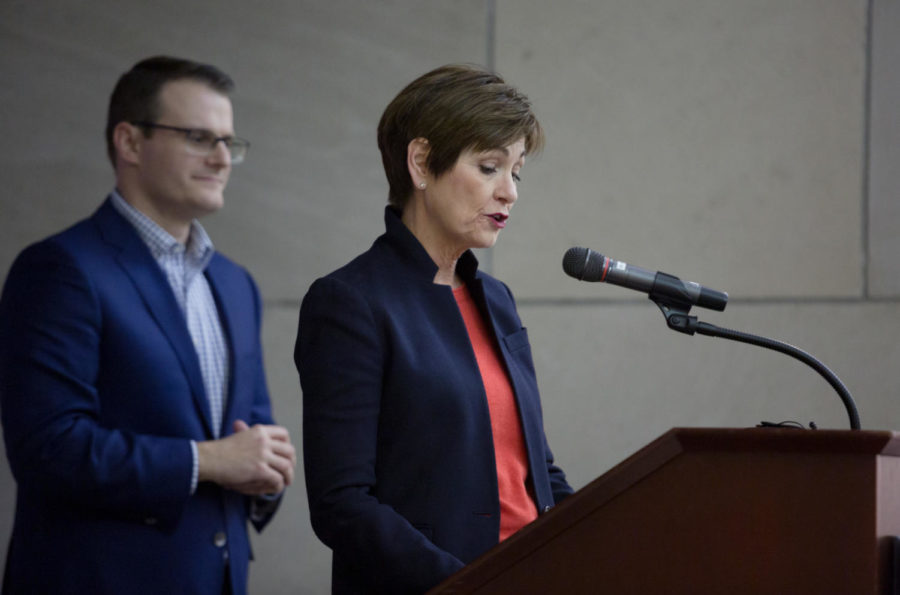Editorial: The Iowa State Daily and The Daily Iowan condemn Reynolds’ special election date selection
Samuel Greene/Iowa State Daily
As she spoke, Iowa Governor Kim Reynolds focused on the recent statistic that Iowa is the #1 state in the nation, a position she committed to maintain. She became governor in May 2017 after then governor Terry Branstad was appointed the United States Ambassador to China.
June 27, 2019
When setting special election dates, Gov. Kim Reynolds must ask herself: “Why ‘get out the vote’ when you can suppress it?”
Constituents of Iowa House District 46 were offered a chance to elect someone new to represent them at the Statehouse when former Rep. Lisa Heddens was appointed to the Story County Board of Supervisors — following former Supervisor Rick Sanders’ appointment to the presidency of the Iowa State Research Park.
However, this opportunity to vote for a new state representative will be limited. Reynolds scheduled the special election for Aug. 6 — three weeks before classes start at Iowa State, a time when many students likely will not have returned to campus.
The Iowa State Daily and Daily Iowan Editorial Boards condemn Reynolds’ decision to schedule yet another special election while many students aren’t around to participate. Whether it’s an intentional effort by GOP politicians to suppress students’ mostly Democratic votes or simply a failure to account for the demographics of their constituents’ legislative districts, Reynolds’ election proclamation is just the latest in the state Legislature’s efforts to suppress students’ votes and silence their voices on the issues they care about most.
In March, Reynolds called for a special election for state Senate District 30, which covers the University of Northern Iowa, to fill former Democratic state Sen. Jeff Danielson’s unexpired term. Out of all potential dates, it was set during spring break when most students are not on campus.
Perhaps one can chalk that up to blissful ignorance, but state politicians have taken other efforts to interfere with students’ voting rights. The Iowa Legislature pursued the passage of Senate File 575, which would have banned satellite-voting locations in “state-owned buildings” such as university properties. This means the universities would have been barred from establishing early-voting locations on their campuses, hurting university efforts to foster civic engagement and empower young voters to head to the polls.
While the bill only made it out of committee, it is clear students are not a priority for the governor or legislative leaders in the Statehouse. Against the wishes of student leaders across Iowa’s regent universities, lawmakers passed a bill in 2017 to require voters show government-issues IDs at the polls. Critics say the law adds another hoop for voters to jump through before casting their ballots, particularly for students because they change addresses frequently and many come from other states.
This attack on students’ democratic rights counters Iowa politicians’ purported interests. Iowa politicians say they hope to encourage students to stay in Iowa to prevent rural “brain drain” and also aim to prepare 70% of Iowans with education or job training beyond high school by 2025 — per the Future Ready Iowa Act that Reynolds championed.
Iowa needs students’ skills, drive and knowledge in the workforce. Yet when state politicians have the opportunity to make an impression on the bright students attending regent universities, these elected officials instead discourage their active participation in a democratic society. Leaders at the Statehouse say they want to keep students in the state, but without encouraging student voices at the polls, they can’t claim to have embraced what that goal entails.
The Legislature and Reynolds have proven apathetic to calls from the Editorial Boards and other student leaders, even though the governor is a regent university graduate herself as an ISU alum.
On issues such as reduced state funding for public higher education and rising tuition or proposals affecting students’ free-speech rights on campus, it is unacceptable that Iowa politicians are hindering students’ access to the polls — the place where students can vote for politicians who will advocate for them on such matters.
Waiting for Iowa politicians to hear students’ voices seems to be a losing game, so the Editorial Boards urge students to assert their own voices in phone calls, letters and — arguably most importantly — at the voting booths.







